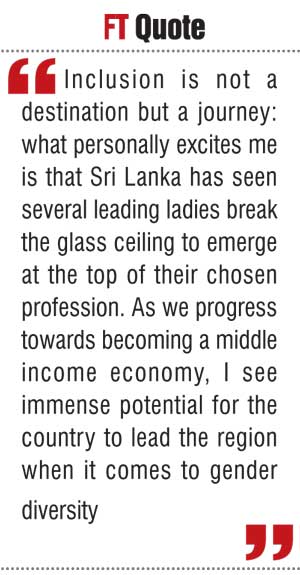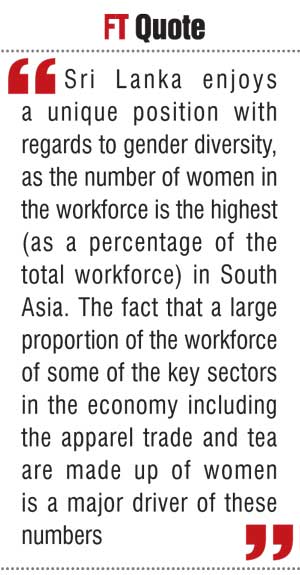Monday Feb 16, 2026
Monday Feb 16, 2026
Monday, 26 October 2015 00:00 - - {{hitsCtrl.values.hits}}
 By Sameer Nagarajan
By Sameer Nagarajan
Globalisation and advances in technology have created a rapidly changing, hyper-connected, global marketplace where businesses need to constantly innovate or face the risk of becoming obsolete. The past decade has seen the decline of once dominant product and service categories and the rise of radically fresh business models that have transformed entire sectors. Consider these simple examples:
Simultaneously, employment demographics are changing dramatically. A majority of the seven billion population on this planet is now under the age of 30 years. Unilever’s own estimate is that about 870 million more women will enter the global workforce by 2020. Digital technologies will make us more deeply interconnected, yet place personal relations and connectedness at a premium.
From a business perspective, the game will increasingly belong to innovators – both individuals and organisations – who passionately pursue game-changing ideas to fruition. Business success will be increasingly determined by the ability to generate such ideas.
Fostering continued innovation
So how do we, as leaders, create an environment that fosters continued innovation? One that inspires teams to think beyond the boundaries of what’s possible and generate transformative ideas?
Having managed people for over 27 years across several international markets – most recently a global workforce while being based in Switzerland and India - I strongly believe that embracing the diversity around us to create inclusive workplaces is a key step in this direction. Creating inclusive workplaces will allow organisations to unleash the power of their teams and unlock innovation.
A diverse and inclusive workforce reflecting the larger society around itself makes the organisation more perceptive of the market’s collective sensitivities. Thus, being closely aligned to the market, the organisation is better equipped to make more informed decisions. Inclusive workplaces encourage all members to contribute to the decision-making process, and these greater levels of interaction between team members bring in diverse thoughts.
This creative and healthy conflict goes a long way in helping organisations create products and services that are more aligned with the evolving needs of consumers. While this strengthens the employer brand, high levels of inclusion by themselves do also help strengthen the employment value proposition.
Workplace diversity comes in different forms such as gender, race, religion, nationality, etc… I believe that focusing our efforts on promoting gender diversity through initiatives aimed at a balanced mix of men and women in the workforce is a great starting point. Research shows and experience validates that organisations who establish gender diversity are then able to establish other forms of diversity with greater ease. Not just establish, they are able to get the best out of this diversity as well.
Gender diversity
Sri Lanka enjoys a unique position with regards to gender diversity, as the number of women in the workforce is the highest (as a percentage of the total workforce) in South Asia. The fact that a large proportion of the workforce of some of the key sectors in the economy including the apparel trade and tea are made up of women is a major driver of these numbers.
At Unilever Sri Lanka, we are close to exceeding a ratio of one in three employees being a woman. Our balanced slate policy requires us to have at least one woman candidate applying and being considered for every opening within Unilever Sri Lanka. At the same time, our approach to talent management is clear that merit is the key criterion for employment. Thus, internal organisational resistance is also minimised, if not totally eliminated. This has allowed us to create more avenues for women to join our ranks while removing all bias by adhering to the principles of meritocracy.
Ground realities
Before we embark on creating a more inclusive workplace, we need to understand certain ground realities. Even while more women have entered the workforce than ever before in the last decade, social structures have not changed at corresponding pace and women are still seen to be carrying a greater share of responsibilities when it comes to running the family.
This is not limited to the so-called ‘traditional’ societies. Even relatively developed economies have gender stereotypes especially around childcare and house maintenance. This, together with the history and emotional baggage around the subject, has led to women feeling pressured to manage both work and home.
As the level of scrutiny sometimes is higher, they also feel explicit and implicit pressure to prove themselves to be better at their jobs than male counterparts. At one level, individual women are beginning to speak out and challenge the status quo (Sheryl Sandberg at Facebook) or at least share their personal journeys (Indra Nooyi at Pepsi). There is nevertheless an urgent need for organisations to focus on having the right mix of resources, policies and systems that empower all employees to realise their full potential.
Inclusion initiatives
At Unilever, we are constantly seeking to innovate and improve on our policies on diversity and inclusion. There are three key pillars to any organisation’s employee inclusion initiatives and we are no different.
We seek to ensure that simplicity, flexibility and respect are built into our policies. All systems and processes including internal communications need to be simple and well defined to help employees achieve greater work-life balance. They should be flexible to accommodate the needs of the individual while working towards the goals of the organisation. Using every opportunity to communicate verbally and non-verbally that diversity is welcome, they need to demonstrate that the organisation respects and celebrates how people are different, encouraging them to bring their unique identities into the open. At Unilever Sri Lanka, we actively listen to the evolving needs of our employees even as we are conscious of changing societal structures and lifestyle patterns. We draw upon these learnings to create policies that are aligned to current times. For instance, we saw an increase in the number of nuclear families with both spouses being employed. The feedback we got was that this further burdened women who traditionally balance the demands of both work and home. Hence we developed a policy around agile working, so employees (whether men or women) can discuss with their managers to work from home or another location and also avail flexible working hours.
We also offered employees career breaks which allow them to take time off from their jobs to honour different personal commitments. Smaller family units translate into the absence of traditional family support structures when raising children, so it was logical for us to extend the stipulated three month paid maternity leave to six months.
As fathers indicated that they were getting more involved in raising children, we offered paternity leave. The same maternity and paternity policies are also extended to adoptive parents. Where necessary, our sites have an on-site crèche operated by trained professionals equipped to take care of children of all ages, right from infancy, to lend a helping hand to parents when they are at work.
We recognise that women do not work only in offices: we have also reviewed facilities on the road for our salesforce, including infrastructure and safety and security practices, changing them as and when needed to better suit the needs of our women employees. Recognising that inclusion requires active role modelling, we actively identify and promote internal champions of inclusion through our Inclusive Leader campaign, where we often showcase the related efforts of some of our younger team members.
In addition to creating a more diverse and inclusive workplace, these initiatives have had a direct positive impact on our business. Operating in the FMCG sector, a great percentage of our products are bought or used more by women. The growing number of women within the company and the related policy changes have brought about a marked change in the way in which we as an organisation think and behave.
With more women on board all our teams, we have been able draw on their insights and personal experiences. These learnings are reflected in everything we do, right from the products we manufacture to the packaging it comes in to the communication that engages the consumer.
Engaging the community
Moving beyond the boundaries of one’s own business, we recognised a need to engage the extended stakeholder community in promoting diversity and inclusion, and work towards bringing about long-term transformation of the business landscape.
Unilever Sri Lanka hence developed a cooperative initiative with likeminded corporates and other stakeholders to create WICE (Women-Inspire-Connect-Empower), a collaboration that is the first of its kind in the country to promote the interests and rights of women as future leaders of their organisations. The members of WICE meet once a quarter to exchange their experiences and thoughts on creating an environment that encourages more women to join the workforce. They also channel their energies into the areas of education and leadership development.
Not a destination but a journey
Inclusion is not a destination but a journey: what personally excites me is that Sri Lanka has seen several leading ladies break the glass ceiling to emerge at the top of their chosen profession. As we progress towards becoming a middle income economy, I see immense potential for the country to lead the region when it comes to gender diversity.
The near universal literacy rate and prevailing high percentage of women participating in the labor-force offer strong fundamentals to build on. Leadership has a special challenge and task to work towards creating more diverse and inclusive workplaces that help organisations tap into the enormous depth and wisdom of the diversity around us.
(Sameer Nagarajan joined Unilever Sri Lanka in May 2015, having worked earlier as the HR Director, Global Supply Chain for Unilever in Switzerland for over three years. He is currently Director – Human Resources and Corporate Relations at Unilever Sri Lanka. He has 27 years of experience across Asia and Europe, in various fields of HR, including talent acquisition, capability development, talent and performance management, Industrial Relations and strategic Business Partnering. Sameer has completed an MBA in HR from XLRI Jamshedpur, India.)